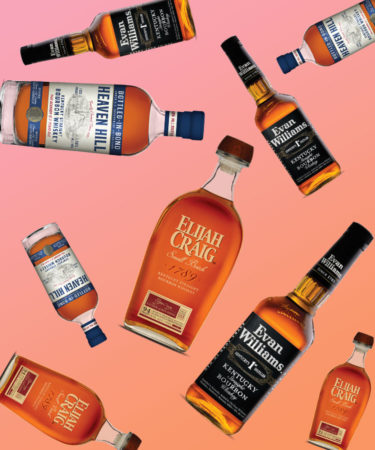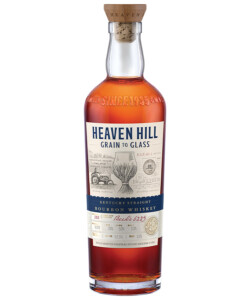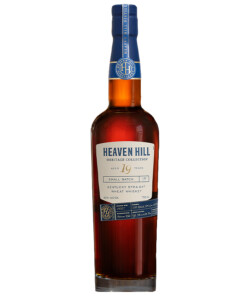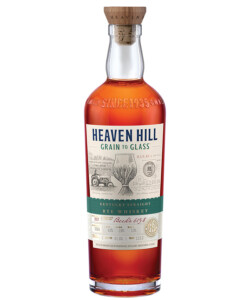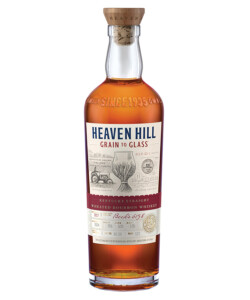Heaven Hill Distillery, founded by the Shapira family in Bardstown, Ky., in 1935, is the largest family-owned and operated distillery in the U.S. It’s also the second-largest holder of barrels in the world, and one of the country’s largest spirits suppliers.
Ready for a taste of whiskey history? Here are 11 more things you should know about Heaven Hill Distillery.
Heaven Hill began as a post-Prohibition proposition.
In 1935, after Prohibition ended in 1933, the five sons of a successful Lithuanian department store owner invested in a fledgling distillery looking to bring whiskey back to Kentucky. The five Shapira brothers eventually became the distillery’s sole owners. One of their sons, Max Shapira, is the company president today. The third generation is now in place, too, with Max Shapira’s daughter Kate S. Latts and her husband Allan Latts ensuring the family-run company’s future, a spokesperson tells VinePair.
You might know Heaven Hill by its other names.
Heaven Hill is famous in its own right, but you may know it better by its flagship bourbon labels, Evan Williams and Elijah Craig. Both have been produced since the 1930s. The distillery also produces the eponymous Heaven Hill Bottled-in-Bond, along with many other brands it either created or acquired: Larceny, Rittenhouse Rye, Henry McKenna Single Barrel, Bernheim Original Wheat Whiskey, Pikesville Rye, Old Fitzgerald Bottled-in-Bond, and Mellow Corn.
Until 2017, Heaven Hill’s distillers had ‘the most famous name in bourbon.’
Heaven Hill has had several members of the Beam family at its still. Most recently was the late Parker Beam, who started with the company in 1960, served as master distiller starting in 1975, and became master distiller emeritus in 2014, after falling ill.
Parker Beam was the son of Earl Beam, grandson of Park Beam, and grandnephew of Jim Beam. Bill Samuels Jr., friend of Parker and former Maker’s Mark executive, said he “lived up to and exceeded the burden of having the most famous name in bourbon.”
In 2019, Heaven Hill appointed Conor O’Driscoll master distiller. Though not a Beam, O’Driscoll is an industry vet, having worked in Kentucky bourbon for 15 years.
Heaven Hill is a young 84.
Despite being born in 1935, Heaven Hill keeps up with the times online. The distillery has its own podcast, “Tales from the Hill,” which delivers insights into the distillery’s heritage. And in March 2019, Heaven Hill brand ambassador Bernie Lubbers hosted a Reddit AMA (Ask Me Anything), devoting two hours to the online forum.
It’s had a few facelifts.
In 2018, Heaven Hill announced a major expansion and renovation — to the tune of $65 million — including $17.5 million toward a rebranding of the Bourbon Heritage Center, a stop on the official Kentucky Bourbon Trail offering tastings and a museum describing the region’s bourbon history. The rest went to new barrel warehousing and equipment upgrades. In total, the distillery has invested more than $100 million in expansions and tourism since 2010, according to the Spirits Business.
It wants you to visit.
Along with the recent renovations to the Bourbon Heritage Center in Bardstown, Heaven Hill also hosts events during the annual Kentucky Bourbon Festival in September. Additionally, visitors can swing by the Evan Williams Bourbon Experience in Louisville any time of year.
Heaven Hill has more rickhouses than America has states.
Heaven Hill is headquartered in Bardstown, Ky. It also operates several facilities in the area, each with its own set of rickhouses, or barrel warehouses. There are currently 58 rickhouses in total, including in Bardstown, Deatsville, Schenley, Bernheim, Glencoe, and Cox’s Creek, Ky. All together, the rickhouses hold 1.6 million barrels.
Heaven Hill offered the ultimate ‘angel’s share.’
On Nov. 7, 1996, a disastrous fire ravaged Heaven Hill’s Bardstown plant. “Flames could be seen shooting 300 to 400 feet into the air from over 20 miles away as the alcohol burned and barrels exploded,” Distillery Trail reports. The flames jumped from warehouse to warehouse, eventually engulfing seven, as well as the distillery. In four hours, more than 90,000 barrels of bourbon were lost. Amazingly, no one was hurt.
It makes smart investments.
In 1999, Heaven Hill acquired additional spirits brands from United Distillers and Vintners, now known as Diageo. As part of the same deal, it also acquired its Bernheim Distillery in Louisville, now the world’s largest single-site bourbon distillery. Other brands Heaven Hill owns include Deep Eddy Vodka and Hpnotiq Liqueur.
Heaven Hill has always been the ‘best.’
The distillery has won dozens of awards, including 30 Best Whiskey wins, 14 Whiskey of the Year awards, seven Distiller of the Year awards, and 42 double gold medals. At the 2019 SF World Spirits Competition, Heaven Hill left with the titles for Distillery of the Year, Best Bourbon, and Best in Show Whisky. It’s the only distillery to win Best in Show Whisky with bourbon.
When Heaven Hill released its 4-year-old Old Heaven Hill Bottled-in-Bond in 1939, it was the best-selling whiskey in the state of Kentucky.
Heaven Hill is part of two Bourbon Counties, in Kentucky and Illinois.
In 2015, Heaven Hill partnered with Chicago brewery Goose Island on a rare variant of the brewery’s Bourbon County Brand Stout. The special-release beers, sold annually starting on Black Friday, are known for kicking off the bourbon-barrel-aged beer trend.
The companies partnered again in 2018, when Goose Island’s Reserve Bourbon County Stout was aged in Heaven Hill barrels. In 2019, the bourbon barrels grace three different releases: Reserve Rye Bourbon County Stout, aged exclusively in Rittenhouse Rye barrels; Bourbon County Wheatwine Ale, aged in Larceny barrels; and the classic Bourbon County Stout, aged in Heaven Hill as well as Buffalo Trace and Wild Turkey barrels.
“Bourbon and beer is a partnership that makes sense,” Conor O’Driscoll, Heaven Hill master distiller, said in a press release.
Edit: This article originally said Ed Shapira was the father of the five Shapira brothers. He was one of the Shapira brothers.
